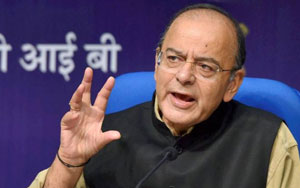New Delhi, Oct 6 : Finance Minister Arun Jaitley Saturday said a Parliament approved legislation can restore mandatory linking of biometric ID Aadhaar with mobile phones and bank accounts, but did not say if the government will bring a new law for the same.
The Supreme Court had last month upheld the Constitutional validity of Aadhaar, the 12-digit biometric based unique identity number, but restricted its use by private entities like telecom operators for verifying identity of mobile phone user.
Jaitley said the verdict was a "very sound judgment" as the court accepted that there is legitimate state aim in Aadhaar.
"Aadhaar is not a citizenship card," he said at the HT Leadership Summit here. "Because after all you have a system where you give a lot of government money in form of various support and subsidies to all kinds of people. That was the principle objective of Aadhaar."
The Supreme Court, he said, upheld most of what Aadhaar does.
"What had not been upheld falls in two categories. One is the principle of proportionality that Aadhaar will help in these cases and then do it by an appropriate law.
"So the whole argument which was given that private companies can't use it, there is Section 57 which says you can authorise others either by law or contract. So what has been struck down is by contract," he said.
Finance Minister said a legal provision through a legislation can restore linking of Aadhaar with mobile phones and bank accounts.
"By law it can still be done, provided you do it under the adequate provision of law and do it on the basis of that in this field it is necessary," he said.
He, however, did not say if the government plans to bring a law in Parliament for the purpose.
Jaitley said the Supreme Court has permitted Aadhaar linkage in several areas like income tax, based on "the principle of proportionality".
"If you are able to show the kind of data that in mobile telephony it (Aadhaar linkage) will help, it can happen. So mobile and bank accounts are two critical areas," he said.
The Supreme Court declared constitutional the government's extraordinary attempt to give every resident a biometric ID. It, however, drew a clear line between two kinds of use for biometric authentication -- its use for state-provided services like payment of subsidies and taxation records was declared acceptable but restricted its use as authentication tool by the private sector like telecom companies and banks.
Let the Truth be known. If you read VB and like VB, please be a VB Supporter and Help us deliver the Truth to one and all.
Panaji (PTI): As part of a crackdown against tourist establishments violating laws and safety norms in the aftermath of the Arpora fire tragedy, Goa authorities on Saturday sealed a renowned club at Vagator and revoked the fire department NOC of another club.
Cafe CO2 Goa, located on a cliff overlooking the Arabian Sea at Vagator beach in North Goa, was sealed. The move came two days after Goya Club, also in Vagator, was shut down for alleged violations of rules.
Elsewhere, campaigning for local body polls, AAP leader Arvind Kejriwal said the fire incident at Birch by Romeo Lane nightclub at Arpora, which claimed 25 lives on December 6, happened because the BJP government in the state was corrupt.
An inspection of Cafe CO2 Goa by a state government-appointed team revealed that the establishment, with a seating capacity of 250, did not possess a no-objection certificate (NOC) of the Fire and Emergency Services Department. The club, which sits atop Ozrant Cliff, also did not have structural stability, the team found.
The Fire and Emergency Services on Saturday also revoked the NOC issued to Diaz Pool Club and Bar at Anjuna as the fire extinguishers installed in the establishment were found to be inadequate, said divisional fire officer Shripad Gawas.
A notice was issued to Nitin Wadhwa, the partner of the club, he said in the order.
Campaigning at Chimbel village near Panaji in support of his party's Zilla Panchayat election candidate, Aam Aadmi Party leader Kejriwal said the nightclub fire at Arpora happened because of the "corruption of the Pramod Sawant-led state government."
"Why this fire incident happened? I read in the newspapers that the nightclub had no occupancy certificate, no building licence, no excise licence, no construction licence or trade licence. The entire club was illegal but still it was going on," he said.
"How could it go on? Couldn't Pramod Sawant or anyone else see it? I was told that hafta (bribe) was being paid," the former Delhi chief minister said.
A person can not work without bribing officials in the coastal state, Kejriwal said, alleging that officers, MLAs and even ministers are accepting bribes.





